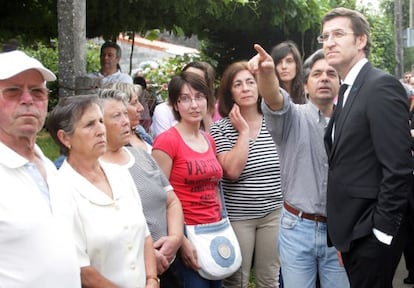Victims of Santiago train crash refuse to attend government memorial ceremony
Groups believe politicians used them and are upset over “obstacles” in the way of the investigation

The decision to award the victims and heroes of the 2013 Santiago train crash with the Medalla de Galicia – the highest distinction given out by in the region – has become a problem for the Galician government. A number of those who were affected by the accident – which left 79 dead and 140 injured – have decided not to accept the medals, given that they feel they have been used by politicians. Meanwhile, residents of Angrois, the neighborhood where the train derailed on a curve due to a driver error, have forced the government to delay the award ceremony so that the first anniversary – which will be commemorated on July 24 – is simply “a day of retreat and silence.”
Both the ruling Popular Party and the main opposition Socialists (PSOE) are opposed to a probe
That said, both the victims that are planning to attend the memorial ceremony and those who refuse to are in agreement about one thing: that the authorities in the region have not done enough to collaborate with the judicial and political investigation into the deadly crash.
The Alvia train that suffered the accident last July was carrying 227 people. More than a hundred of the victims, or their families, form part of the Victims Association of the Alvia Santiago Rail Accident (Apafas), which was the first group to be formed in the wake of the tragedy. Meanwhile, around 40 people make up the Alvia Victims Platform 01455, which includes the presence of the former Popular Party deputy in the Madrid regional government, Teresa Gómez-Limón. This second group is more critical from a political point of view, and has insistently demanded a parliamentary investigation, supported – albeit with less vehemence – by the Apafas group.
Both the ruling Popular Party and the main opposition Socialists (PSOE) are opposed to such a probe.
Both groups are also highly critical of the obstacles that have been put in the way of such an investigation. Spain’s rail authorities, Adif and Renfe, have delayed handing over documents on a number of occasions, obliging Public Works Minister Ana Pastor to publically call on her subordinates to collaborate in the preliminary investigations.
The regional government refused to accept the three independent investigators initially chosen
A judge in charge of the probe also found that the regional government refused to accept the three independent investigators that had been initially chosen. Two of them were substituted with technicians from the region, whose independence has been thrown into doubt by the victims.
The groups have also been angered by the fact that the High Court in A Coruña decided not to continue an investigation whereby 22 directors and technicians of Adif had been named as official suspects in the probe into the causes of the crash.
Tu suscripción se está usando en otro dispositivo
¿Quieres añadir otro usuario a tu suscripción?
Si continúas leyendo en este dispositivo, no se podrá leer en el otro.
FlechaTu suscripción se está usando en otro dispositivo y solo puedes acceder a EL PAÍS desde un dispositivo a la vez.
Si quieres compartir tu cuenta, cambia tu suscripción a la modalidad Premium, así podrás añadir otro usuario. Cada uno accederá con su propia cuenta de email, lo que os permitirá personalizar vuestra experiencia en EL PAÍS.
¿Tienes una suscripción de empresa? Accede aquí para contratar más cuentas.
En el caso de no saber quién está usando tu cuenta, te recomendamos cambiar tu contraseña aquí.
Si decides continuar compartiendo tu cuenta, este mensaje se mostrará en tu dispositivo y en el de la otra persona que está usando tu cuenta de forma indefinida, afectando a tu experiencia de lectura. Puedes consultar aquí los términos y condiciones de la suscripción digital.








































